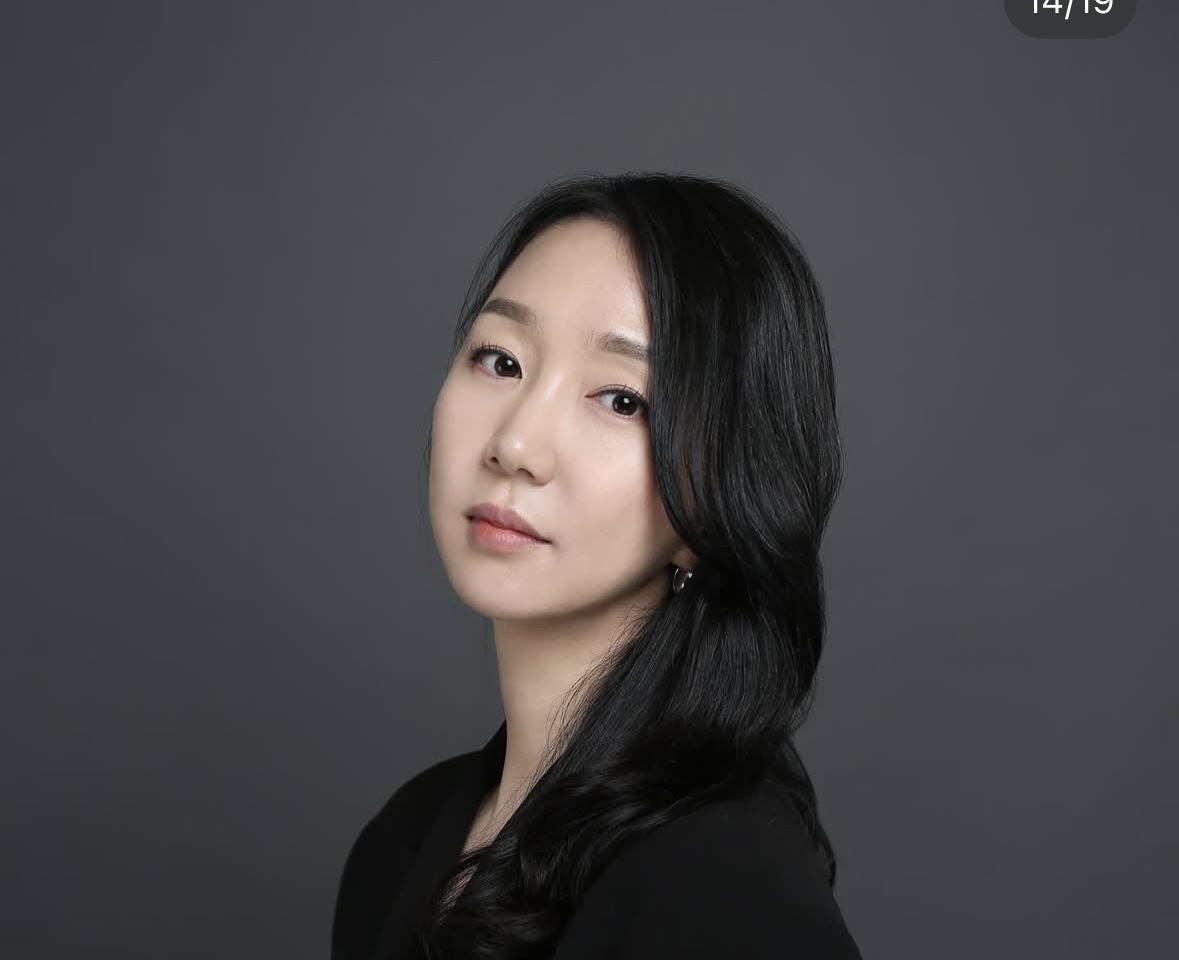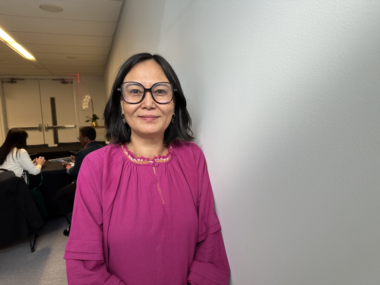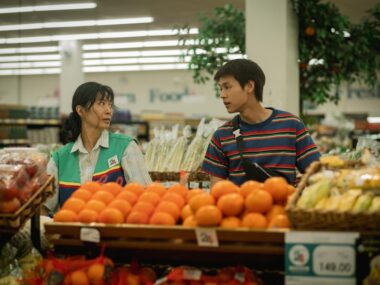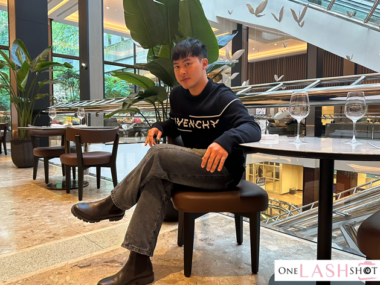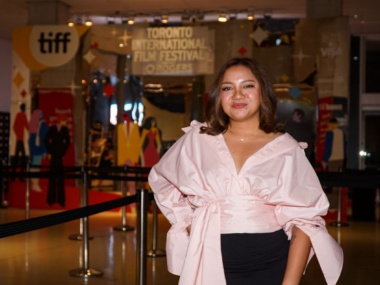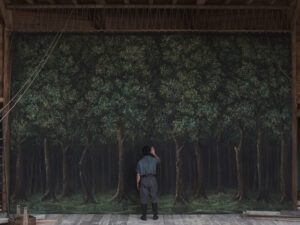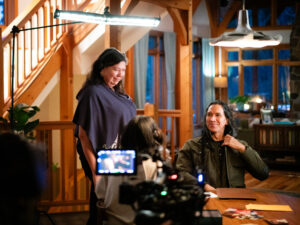Korean director Namkoong Sun initially graduated from the Department of Architecture at Seoul National University before enrolling in the School of Film, TV, and Multimedia at the Korean National University of Arts. She garnered attention for her numerous short films and made her feature debut with Ten Months, which earned a special mention in the Uncaged Award competition at NYAFF 2021. Among her notable works is the short film The Worst Friends, starring Kim Soo Hyun. Created as part of a student project at the Korea National University of Arts’ Film Department, this film was selected for the 8th Korea Mise-en-Scène and praised for its commentary on social issues. At the Short Film Festival, it won the Best Work Award in the City of Sadness category, with Director Park Chan-wook serving as the chief judge.
Now, she returns with a soulful story of three individuals haunted by their K-pop past. Time to Be Strong is an introspective coming-of-age drama that follows three retired K-pop idols who take a trip to Jeju Island. After failed careers and missed school trips, they finally have the chance to travel on their own. Sumin (Choi Sung-eun), sleepless and restless; Sarang (Ha Seo-yoon), clutching her melodies; and Tae-hee (Hyun Woo-seok), battered yet resilient, journey past tangerine groves, desolate tracks, and flickering campfires. Winner of the Grand Prize at Jeonju, this subdued yet fiery film argues that true strength lies not in spectacle, but in the quiet, shared decision to keep moving forward. The film had its North American premiere on July 25th at the New York Asian Film Festival.
One Lash Shot had the unique opportunity to chat with Director Namkoong Sun about the dark side of the K-pop world, the lasting effects on former idols, and the striking reflections of these struggles in the lives of Korea’s youth today.
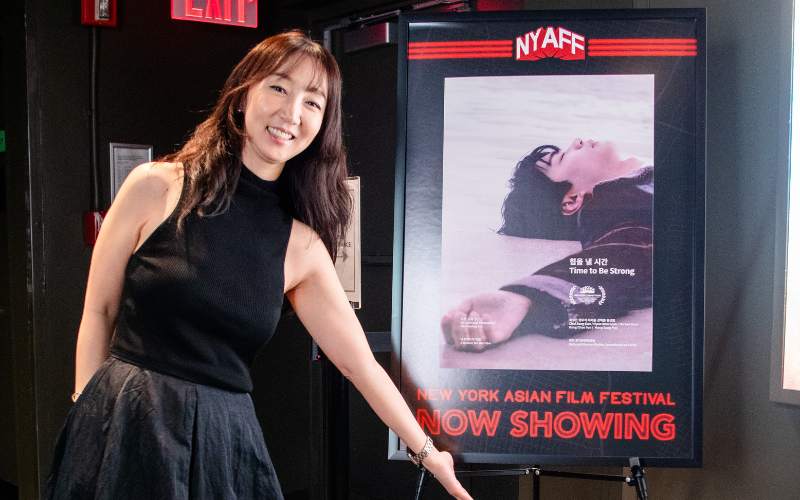
What made you get into the film industry in the first place?
I was actually an architecture student in university, but I realized I was creating 3D models of people and familiar places. I also discovered my enjoyment for timeline-based editing during that time. So, I applied to film school on a whim, and that’s how my film career began.
What made you make this film revolving around the dark side of k-pop idols? Was it a personal experience of someone you know that sparked that idea?
In the beginning, this project was commissioned by the Human Rights Council of Korea. They provided an independent film budget and have a program that invites directors to make films on human rights. I was selected to make the 2022 film. So, I had to create something, and since I’ve always been interested in coming-of-age stories, I saw a lot of parallels between the lives of K-pop idols and the experiences of modern Korean adolescents coming of age today. It wasn’t so much a personal reason—many of my friends work in the industry, so I felt there was something worth exploring. I quickly covered the topic and wrote the script.
So, I wouldn’t say I have a personal experience with this subject matter.
How did you approach writing and directing this film?
This project came together quickly. I had only one to two months to write. Personally, I sought out people who had either retired from the K-pop industry or hadn’t had much success. I conducted personal interviews with them. I also had a friend living on Jeju Island at the time and wanted to collaborate on a project with them, so we decided to set the story in Jeju. The characters developed naturally as I interviewed people from the K-pop industry.
Would it be possible to let me know if there are any specific K-pop idols you’ve interviewed that you used as references?
I interviewed quite a few people who had been in the K-pop industry, but since they spoke on the condition of anonymity, I can’t reveal their identities. Some had debuted but didn’t find success, while others had only gone through the trainee experience. What surprised me, though, was the extent of the human rights violations, the trauma they endured, and the exploitative labor conditions they faced. I took all this information and tried to reflect it in the film.
One conscious decision I made was to keep the film grounded in the present, rather than directly portraying their past experiences in the industry. I felt that doing so might be too traumatic for them to watch.
How did you go about casting Choi Sung-eun, Hyun Woo-seok and Ha Seo-yoon?
When I first started this project, I initially thought about casting former K-pop idols or trainees, as there are so many talented ones out there. But, as I mentioned during the interviews, I realized I couldn’t go that route. I wasn’t sure how it would affect the actors, especially since they’d have to relive some of their past experiences. Also, if the film were finished and we had to do interviews, it might be difficult to protect their mental well-being and the trauma they had gone through.
I was focused on casting former idols who were great at singing and dancing. But I shifted my approach to finding actors who could bring something unique to the characters, based on their strengths.
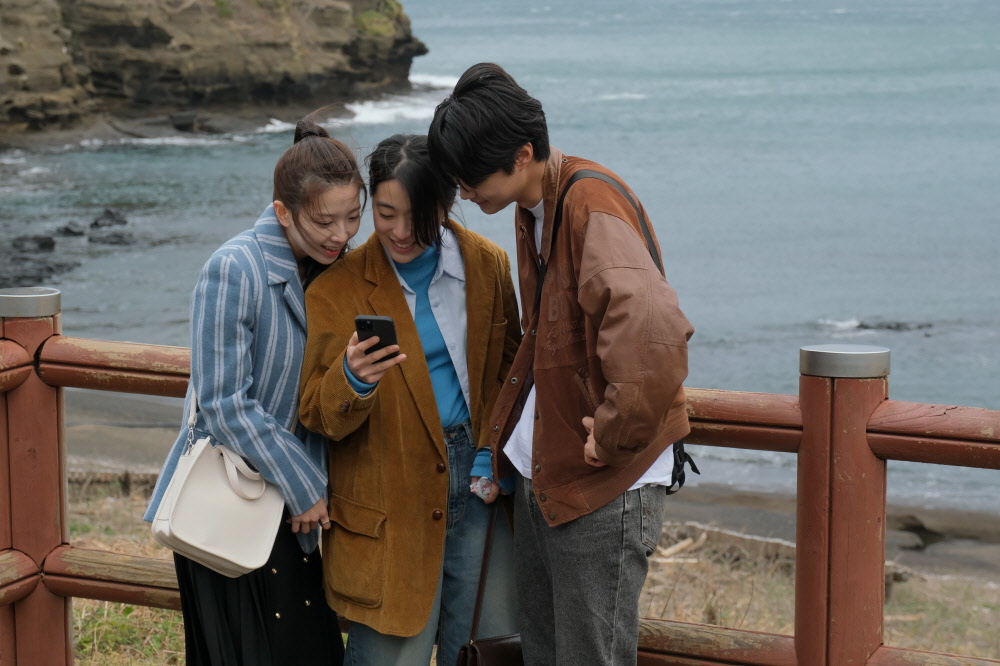
Ha Seo Yoon auditioned for the role, and she was such an excellent actress, which is how we found her. As for Hyun Woo-Seok, the character of Tae-hee had a signature smile, and I found that in him, so that’s how he joined the project. I had worked with Choi Sung-eun on my previous feature, and when I mentioned this project to her, she asked to read the script. After reading it, she said, “I’d love to do this,” and that’s how she came on board.
I thought the three of them, with their distinct personalities, really gelled well together as an ensemble.
Was the placement of the Lost and Found center intentional? Was it meant to symbolize what was happening in the minds of the three idols?
Yes, it was symbolic in a way. These kids have lost so much and don’t know what they’re going to find. So, having Sarang lose her suitcase became the inciting incident that sets them on this path, leading to all the trouble they get into. I do think it serves as a symbol.
Is the K-pop industry truly as dark as it seems? For instance, Taehee’s 300 million won debt—how did that situation unfold? And the experiences of Sumin and Sarang, constantly having to use birth control pills because of the outfits they’re required to wear as performers—does this really reflect the harsh realities of the industry?
Yes, everything in the film, including the dialogue, was drawn from individual interviews. One concern I had while making the film was ensuring that no specific story or incident alluded to any particular K-pop idol. I focused instead on the recurring themes and stories that came up during my interviews.
While it’s true that success in the K-pop industry can lead to material wealth and fame, I think the fundamental issue is that most idols are working under incredibly exploitative contracts, almost like slave labor. This is deeply concerning. The companies are exploiting everything they can from these contracts.
I’ve interviewed people who hit rock bottom and even contemplated suicide, and of course, some idols have tragically gone through with it. I wanted to shed light on the darker side of the industry, where many scars still remain.
What was most challenging scene?
For me, the whole film was challenging—probably every part of it. We had a very small budget, so we intentionally kept our crew small and focused. Most of the scenes didn’t have much lighting or many people, which made things challenging but also really fun. It allowed us to move the camera more instinctively with the actors.
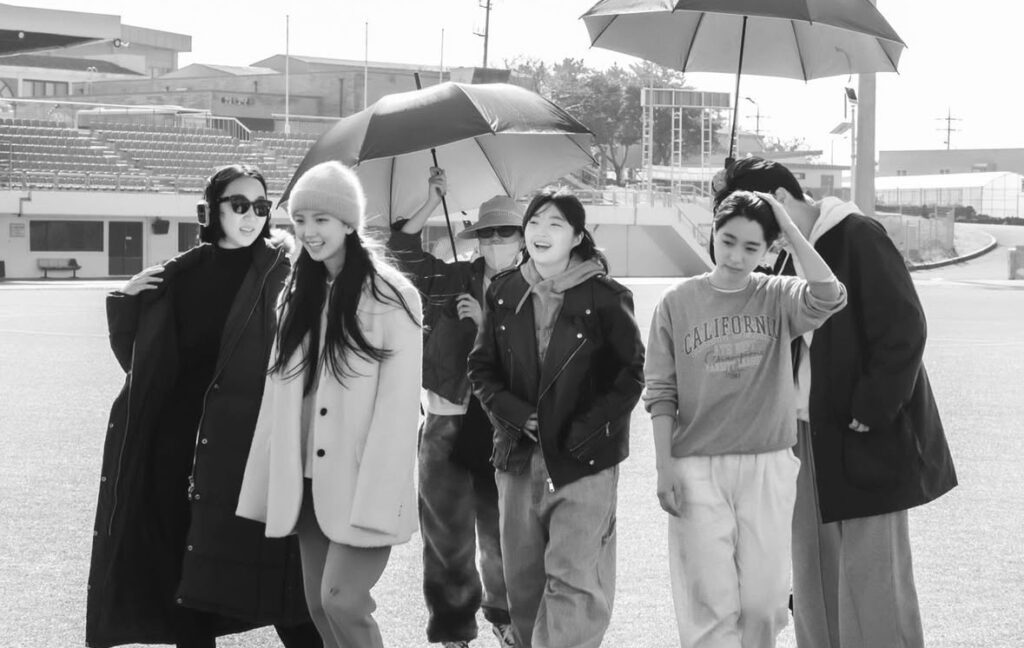
The night scenes, especially the forest scene where they search for Sarang, were particularly tough. We designed it using just two practical lights. Since Jeju is an island, planes are constantly flying overhead, which made it feel like we were shooting a jungle war scene. But in the end, it was a lot of fun.
When you mentioned Yera’s last two sentences—“I am here. I, a person, am here”—what was the intended meaning behind that?
I think there are two meanings to that quote. The first is about asserting one’s humanity. The K-pop industry is so massive, almost like a machine, and in that system, it’s easy to forget that most K-pop idols start out as children. When Yera says that in her note, she’s trying to get others to acknowledge her existence as a human being.
The second meaning emerges when Sumin says it aloud at the end of the film. In this context, it’s a declaration of resolve—a promise to herself that “I am here, and I will not fade away.”
In Korean, if you translate “there’s a person here,” it can also carry a sense of a cry for help, like “there’s a person here who needs help.” It’s often used to call attention to someone in need, to ask for help. So, in that sense, the quote takes on that meaning as well.
If there is one word that you had to come up with to describe the theme of your movie, which would it be?
Agency. think this is what’s being taken from these kids, and it reflects what young people are going through in Korea today. What they experience in the film mirrors the reality for many young people, as they’re constantly being observed and judged. It feels like their entire lives are being graded. The pressure is so intense that they can’t afford to fall behind in this fierce survival competition.
In that process, they lose a sense of agency, as everything is dictated by external social pressures.
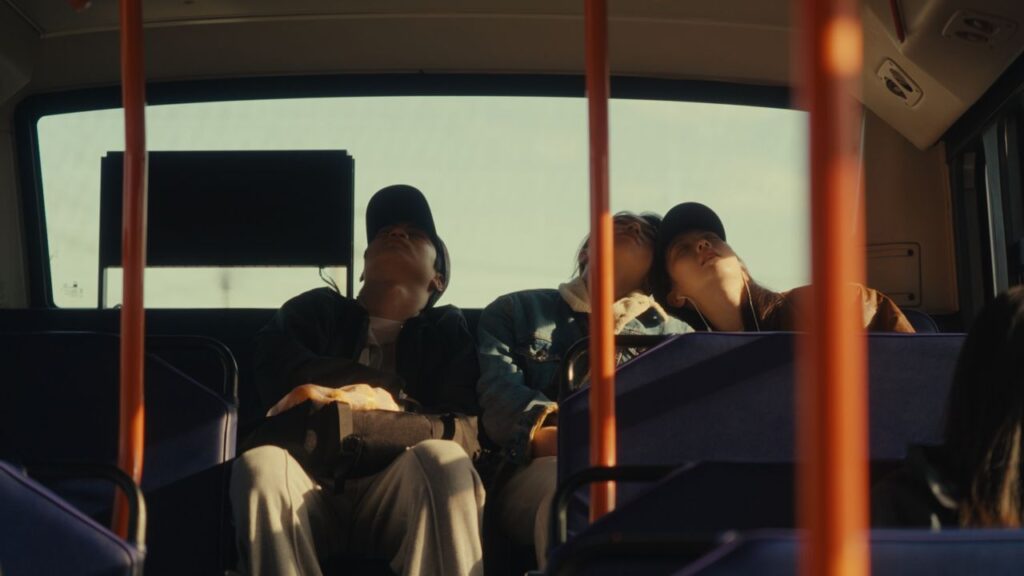
What’s your favorite scene in the movie?
My personal favorite is the scene where the kids go on a trip on a really windy day. We had many unplanned moments in the film, and it happened to be a bad weather day, but we decided to go out because we thought it would be fun to capture the real Jeju, the true winds of Jeju. We didn’t have much of a plan, and the actors were just looking out at the sea when, suddenly, they started running toward the fence and then toward the ocean. Everyone, including the crew, just followed them. It was so much fun. Every time I watch that scene, I think about how much I love it.
Do you have a favorite K-pop idol group?
Recently, I’ve been enjoying Kiss of Life as a girl group, and there’s a virtual idol group called Play. I think both of these groups have some agency in their music. I’m not sure why, but they’re my favorite groups at the moment.
I tend to gravitate toward bands or groups that have a sense of space in their music. Groups that feel a bit looser, where there’s room to breathe. Most K-pop groups, however, don’t have that space; everything is so calculated and perfect. I prefer groups that allow for a bit more freedom and looseness, and the groups I mentioned earlier have that quality. When I listen to their music, it feels like they’re creating it themselves and having fun with it.
I do enjoy K-pop songs—they’re so catchy. But after making this film, it’s harder for me to enjoy them the same way. The songs get stuck in my head, and my body starts moving to the beat, but then I remember how I feel about the companies behind them, and it leaves a bitter taste. Not all companies are bad, though. Some are actually quite decent. But many of the larger, more mainstream ones, especially the ones I’ve learned about through this project, are problematic.
Before making this movie, how did you feel about the media’s coverage of K-pop idols, particularly regarding their deaths or suicides and the darker side of the industry?
Before making this movie, I felt sad, but there’s something different now. Of course, I’ve seen the news about K-pop idols committing suicide, just like you have. But my experience of meeting these idols and hearing their stories firsthand was a completely different reality. They say they’re okay, but I can truly sense the immense trauma and suffering they’ve endured.
Recently, I watched K-Pop Demon Hunters on Netflix. I don’t know—while watching it, I kept crying because the emotional weight of what the members were going through hit me deeply. It really pierced something in the pit of my stomach. Since making this film, I’ve become so much more empathetic toward their struggles, and I relate to them much more because I’ve been in close contact with these people. Sometimes, my blood boils for them and with them.
Is your next project going to focus on something similar?
Making this movie was really psychologically challenging, so I felt like I needed a break. That’s when I came across a Netflix project—a romance film called Love Untangled. We’ve already finished shooting it, and it’ll be coming out soon. It’s a light, silly teen romance.
[Author’s Note: 고마워요, 언니! I look forward to watching Love Untangled.]

